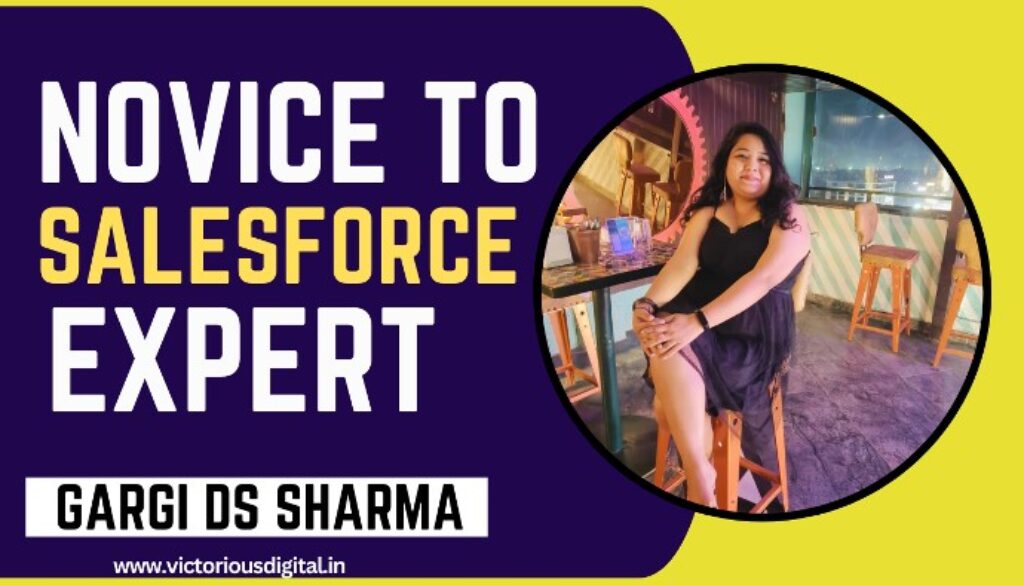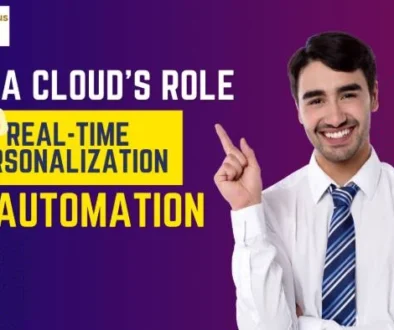From Novice to Salesforce Expert: Gargi DS Sharma’s Journey
Introduction
Hello and Welcome, My Name is Gargi DS Sharma
Starting a career in technology can be overwhelming, especially when diving into platforms like Salesforce. My journey began with Salesforce classes in Pune at the Victorious Digital Institute, where I started with learning the basics of Salesforce. I didn’t know much about Salesforce or how it worked. But as I started learning, I realized how powerful and useful this platform could be. I had no idea that this first step would lead to a rewarding career filled with challenges and growth.
In this blog, I’ll share my path from a beginner to becoming a Salesforce expert with experiences and lessons learned along the way. I hope my story inspires others who are just starting out in their careers.
Table of Contents
The Beginning: Learning at Victorious Digital Institute, Pune
My Salesforce adventure started with a Salesforce course in Pune at Victorious Digital Institute. The training was thorough and practical, helping me understand how Salesforce works in the real world. Teachers shared their experiences, making the lessons more understandable and interesting. When I first enrolled in the course, I was a bit nervous. The world of Salesforce seemed huge and complicated, and I wasn’t sure if I could learn everything. But the structured course and classes at Victorious Digital made the learning process smooth and engaging. The course covered all aspects of Salesforce, from the basics to more advanced topics.
The training sessions were a mix of theoretical lessons and hands-on practice. We started with the fundamentals of Salesforce, learning about its architecture, data model, and core functionalities. The teacher used real-world examples to explain how Salesforce is used in various scenarios, which made the concepts easier to understand. They also shared their personal experiences from working in the industry. One of the most valuable parts of the course was the hands-on practice. We created our personal salesforce developer orgs/accounts where we could experiment with different features and functionalities. This practical experience was crucial in helping me understand how to apply what I was learning. We worked on various exercises and projects that helped build my confidence.
The instructors at Victorious Digital were experts with several years of experience in Salesforce. They were not just teachers but mentors who guided us through the learning process. They were always available to answer questions and provide additional support when needed. Their insights into the salesforce were invaluable, as they shared tips and best practices that are not something you can find on internet. Throughout the course, I learned everything about Salesforce – from Administration to Development. We covered topics such as creating and managing objects, fields, and records, automating business processes with workflows, process builder and flows, and developing custom applications using Apex, Visualforce and Lightning Web Components. We also learned about Salesforce’s security model, data management, and reporting and visualizing capabilities.
This solid foundation prepared me for a significant milestone: getting my first job placement. After the course completion, we were also provided some training sessions where we learned how to create effective resumes, prepare for interviews, present ourselves professionally and we also gave mock interviews. The institute also had a placement cell that helped connect us with potential employers and got us lined up for interviews at our desired locations. With my new skills in hand, I was both excited and nervous about entering the corporate world. The training at Victorious Digital had equipped me with the knowledge and confidence I needed, but I knew that real-world experience would be different. The support from my instructors gave me the courage to take this next step in my career.
Another significant aspect of my time at Victorious Digital was the opportunity to network with other students and professionals. I still have contact with some of my batchmates and we help each other out when stuck in some functionalities and requirements. These networking opportunities were invaluable in building connections and learning from others’ experiences. The journey of learning Salesforce didn’t stop with the course. Victorious Digital thought me the importance of continuous learning. The technology is always evolving, and staying updated with the latest trends and developments is important.
Looking back, my time at Victorious Digital Institute was a transformative experience. It laid the foundation for my career in Salesforce and gave me the skills and confidence to succeed in the corporate world. The comprehensive training, hands-on practice, and support from industry experts – all played a crucial role in my journey from a novice to a Salesforce expert.
Also Read – Salesforce Course Syllabus for Admin & Development
Entering the Corporate World
Joining my first company was a major moment in my career and Salesforce course at Victorious Digital helped me to get placed. I was thrilled to be in a professional environment, but I quickly realized that my learning had only just begun. It was both exciting and a bit intimidating. My employer was very supportive and encouraged me to dive deeper into Salesforce. They wanted me to become more skilled and knowledgeable, so they wanted me to start with Salesforce Trailhead.
Salesforce Trailhead is an online learning platform that offers various courses and modules on different aspects of Salesforce. It became my go-to resource for learning. I spent hours exploring different trails and modules, each one teaching me something new. I learned about Salesforce’s various features, tools, and best practices. The more I learned, the more confident I became in my abilities.
Through consistent effort and dedication, I achieved the status of a Four-Star Ranger on Trailhead. This recognition was a big milestone for me. It showed that I had a solid understanding of Salesforce and could apply my knowledge effectively. But I knew that this was just the beginning. The real test of my skills was about to start now, as I began working on real projects and facing real challenges.
In the corporate world, I quickly learned that theoretical knowledge was not enough. I had to apply what I had learned in practical situations. This meant solving problems, working with teams, and meeting deadlines. Each day brought new challenges and opportunities to learn. My colleagues were very helpful and always ready to share their knowledge and experience. This collaborative environment helped me grow both professionally and personally.
Looking back, joining my first company was a significant step in my career. It provided me with the opportunity to apply my knowledge, face real-world challenges, and grow as a professional. The support from my employer and colleagues, combined with the resources available on Salesforce Trailhead, played a crucial role in my journey. The recognition as a Four-Star Ranger was a proud moment, but it was just the beginning of a continuous journey of learning and growth. The real test of my skills was about to start now, as I began working on real projects and facing real challenges.
Facing Challenges: My First Project
Not long after achieving my Trailhead milestones, I was assigned my first project. The requirement? Third-party Integration. As a fresher in Salesforce, the pressure was immense. I felt nervous about such a complex task, especially without a senior colleague to guide me.
But I was determined to succeed. I turned to online resources and started researching Salesforce integrations. I read documentation, watched videos, and gathered knowledge from whatever resource I could get. Let us start with getting some insights about integration:
Understanding Integration in Salesforce:
Integration in Salesforce refers to the process of connecting Salesforce with other systems to ensure seamless data flow and functionality. This is crucial for businesses that use multiple systems and need them to work together efficiently. Integration can involve various tasks such as data synchronization, API development, and real-time data exchange.
Tools I Use for Integration:
During my projects, I have used several tools to facilitate integration. Here are some of the key tools:
Postman: This is an API testing tool that helps in developing and testing APIs. It allows you to send requests to your API and see the responses, making it easier to debug and ensure everything is working correctly.
Salesforce Connect: This tool allows you to integrate external data sources with Salesforce in real-time. It uses OData (Open Data Protocol) to access data from external systems without storing it in Salesforce.
Heroku: Heroku is a cloud platform that supports several programming languages. It can be used to build, run, and operate applications entirely in the cloud, making it a great tool for integrating Salesforce with other cloud-based applications.
Data Loader: This is a client application for the bulk import or export of data. Use it to insert, update, delete, or export Salesforce records.
Salesforce API: Salesforce provides several APIs (REST API, SOAP API, Bulk API, etc.) that allow you to interact with Salesforce programmatically. These APIs are essential for integrating Salesforce with other systems.
Einstein Analytics: This is a powerful analytics tool that allows you to create custom dashboards and reports. It can be integrated with other systems to provide a comprehensive view of your data.
Working on my first project was a challenging yet rewarding experience. It taught me the importance of thorough research, continuous learning, and using the right tools to achieve successful integration. Each tool I used played a crucial role in ensuring the project was completed efficiently and effectively. This experience not only boosted my confidence but also deepened my understanding of Salesforce and its integration capabilities.
While theoretical knowledge is important, hands-on experience is where real learning happens. I began coding and developing APIs, facing numerous challenges along the way. Each problem I encountered taught me something new and pushed me to grow.
One particular moment that remains as fresh as ever in my memory: when I tested my first functionality after deployment. The nerves were high as I used Postman for testing, and I encountered a 400-status code error. Instead of giving up, I persevered. After several attempts and adjustments, I finally received my first successful 200 status code. The joy I felt at that moment was indescribable; it was proof that my hard work was paying off.
In my first project, I worked on integrating Salesforce with a third-party website and Google Cloud. I created APIs and tested them using Postman, ensuring everything worked correctly. I also saved data from Google Cloud to Salesforce. Additionally, I developed a chatbot for the client’s website using Einstein Analytics and Einstein Bot. This project was a great learning experience and helped me understand the practical aspects of Salesforce integration.
The Importance of Continuous Learning
That first successful API call taught me an essential lesson: studying is important, but practical experience is irreplaceable. The tech world, especially Salesforce, is always changing. To stay up to date, I committed to continuous learning and applying my knowledge in real-world situations.
After that project, I was fortunate to work on many others, each with unique requirements. With each new challenge, I broadened my understanding of Salesforce and its capabilities. I handled issues I never expected, but each experience further improved and added to my skills and confidence.
As time passed, I wanted to expand my skill set even more. I explored various Salesforce clouds and tools, each offering new opportunities for growth.
Tips for Beginners in Salesforce
For those just starting out in Salesforce, here are some tips that helped me along the way:
Start with the Basics: Begin with understanding the core concepts of Salesforce. Trailhead is a fantastic resource for this.
Hands-On Practice: Theoretical knowledge is important, but hands-on practice is crucial. Try to work on real projects or different scenarios.
Join the Community: Salesforce has a vibrant community. Join forums, attend webinars, and participate in local user groups.
Certifications: Aim for Salesforce certifications. They not only validate your skills but also boost your confidence.
Stay Updated: Salesforce is constantly evolving. Keep yourself updated with the latest features and updates.
Ask for Help: Don’t hesitate to ask for help. The Salesforce community is very supportive. You can just post your doubts or issues on trailhead forums/groups and you’ll see many people coming up to solve it.
Also Read – Salesforce Interview Questions & Answers
Personal Lessons Learned
Reflecting on my journey, I realize how far I’ve come from being a novice to becoming a Salesforce expert. Each step, each challenge, and each success has contributed to my growth. The journey has not been easy, but it has been incredibly rewarding. I remember the countless nights spent debugging code, the excitement of learning a new feature, and the satisfaction of delivering a successful project. These experiences have shaped me into the professional I am today.
One of the most memorable experiences in my Salesforce journey was working on the first project, as a fresher without any senior guidance, that required integrating Salesforce with a legacy system. The challenge was not just technical but also involved understanding the business processes of the client. I spent countless hours understanding their requirements, mapping out the integration points, and ensuring that the data flow was seamless.
During this project, I learned the importance of communication. Regular meetings with the client helped in understanding their requirements and expectations. It also taught me the value of patience and perseverance. There were times when things didn’t go as planned, but staying calm and focused helped in finding solutions.
Conclusion
As I continue to grow in my career, I remain committed to continuous improvement. I regularly set aside time for learning new skills and exploring new features in Salesforce. My future goals include achieving more advanced certifications and contributing to the Salesforce community by sharing my knowledge and experiences.
Looking back on my journey, one belief stands out: it doesn’t matter how you start; what truly counts is the effort you put in. My initial fears have turned into confidence, and challenges that once seemed impossible have become stepping stones in my career.
Today, I’m proud of the expertise I’ve developed in Salesforce and the projects I’ve successfully delivered. But I know the learning never stops. As I continue to grow, I remain committed to exploring new technologies, refining my skills, and embracing every opportunity for improvement.
If you’re considering a career in Salesforce, I highly recommend exploring and enrolling in a Salesforce course in Pune at Victorious Digital. These courses provide a solid foundation and open up numerous career opportunities. I’ll always be thankful to Victorious Digital for providing me an immense opportunity to learn and grow.
In both Salesforce and life, the journey is defined by the effort you invest. With each challenge overcome and each new skill learned, we move closer to becoming experts—not just in our careers, but in life itself.




